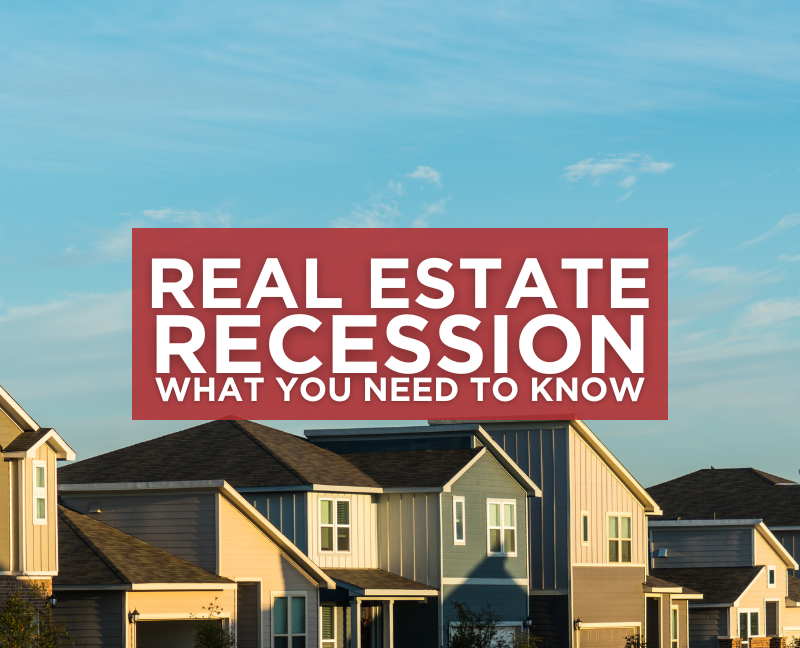As recession fears grow, you may be wondering how a recession affects house values. A recession can have an impact on property prices, but you should not expect home prices to decline. Any change in housing prices during a recession will be influenced by unique circumstances. These are the supply of available homes for sale, as well as the health and size of the active homebuyer audience.
Every day, we assist clients in determining the value of their real estate in Indiana. If you're not from Indiana but want to know what happens to housing values during a recession, keep reading.
What a Recession Means for the Real Estate Market
A recession is a major reduction in economic activity that lasts for a lengthy period of time.. Recessions usually affect the majority of the economy, including the property market. A recession can have a variety of effects on the property market.
The most likely result is decreased overall activity. Fewer transactions will come from fewer sellers wanting to sell and fewer buyers willing to acquire. During a recession, observers and experts in the housing market should expect fewer home sales and purchases.
Second, the market's buyer and seller behavior will shift. More expensive house sellers may become more willing to negotiate with homebuyers. Homebuyers may benefit from this. Homebuyers, on the other hand, are likely to become more protective about property pricing and more demanding of concessions.
Finally, during a recession, housing prices can become more volatile. However, a significant price reduction is not guaranteed. Home prices are affected by housing demand, employment rates, interest rates, and inflation.
What Happens To Home Prices During A Recession?
During a recession, housing prices might rise, fall, or remain flat. Both supply and demand are required in the housing market.
To better grasp what to expect or to make more accurate predictions regarding the housing market during a recession, you must first understand the elements that drive housing supply and homebuyer decision-making.
5 Factors Influencing Home Purchase Behavior During A Recession
The following factors have the most sway over the US housing market. Understanding this will help you better predict what will happen to housing values during a recession.
Unemployment Rates
During a recession, the unemployment rate will affect real estate prices. If unemployment remains low, many people will remain confident in their ability to earn a living. This will boost homebuyer confidence and encourage greater property prices. However, if the unemployment rate rises, many purchasers will become hesitant and wait for a certain moment to buy a property. In this case, housing prices will plummet.

Interest Rates On Mortgage
Mortgage interest rates have a significant impact on home values. If mortgage interest rates are high and rising, there is a considerable likelihood that housing values will fall during a recession.
For starters, a higher mortgage interest rate increases the cost of borrowing money to purchase a property. As a result, to get the same repayment price, the buyer must offer less for the residence. Buyers can also offer the same amount but will have a higher mortgage payment due to the increased mortgage interest rate.
Second, rising mortgage interest rates reduce home prices by harming present homeowners. A family that owns a home but needs a larger home is unlikely to go from, say, a 3% mortgage rate to a 6% mortgage rate. Instead, that family will try to wait for the mortgage rate to fall. This restricts supply because that family is not selling, but it also removes activity from the market.
Finally, many first-time buyers will become dissatisfied with the process of purchasing a property. They saw the earlier lower rate as a squandered opportunity. Many people would prefer to wait for the cheap rate to return in the future. Again, during a recession, this activity will reduce total activity and may result in reduced property prices.
Wage Growth Vs. Inflation Rate
Inflation and salary growth go hand in hand. Consumers will feel the pinch as costs for basic goods and services rise. Homebuyers will be unwilling or hesitant to pay high costs for a property if prices rise faster than wages. If salaries do not keep up with inflation, house prices will fall during a recession.
Quantity Of People Within Specific Age Brackets
The size of the active homebuyer audience is important. The more people who are ready to buy a property at the entry level, the more activity and housing demand there will be in the housing market. This will cause housing values to rise. However, if there are few prospective buyers at the entry level, property prices will fall owing to a lack of housing demand.
The most significant factor to consider is the number of people aged 25 to 35 at the bottom. The United States currently has over 44,000,000 people in this age bracket, which is the highest number in history. This is one of the key reasons why the property market has performed so strongly since 2019. This big entry-level base will also help to stabilize housing values amid a 2020s recession.
Supply Quantity And Quality
What happens to house prices during a recession is heavily influenced by housing supply. However, supply comes in two parts.
The first component of supply is quantity. This aspect of supply is often mentioned. If supply is limited and demand is high, property prices will rise. If there is more supply than demand, housing prices are projected to fall. During an economic slump, the other component of supply that is less discussed becomes highly significant.
The other side of supply that is rarely discussed is the supply's quality. Specifically, the supply's aspirational desire. Homes must entice prospective buyers. For years, the same sorts of homes and home styling have been built in numerous sections of the country.
As a result, folks who can afford the latest and greatest in new homes may be hesitant to purchase. This is because the newest stock is uninteresting. This will create a bottleneck by keeping the middle tier of the market in their current homes owing to a lack of desire to relocate.
We hope that this post has enlightened you. If you have any questions or want to learn more about real estate, please call us at 317-298-0961 today!

